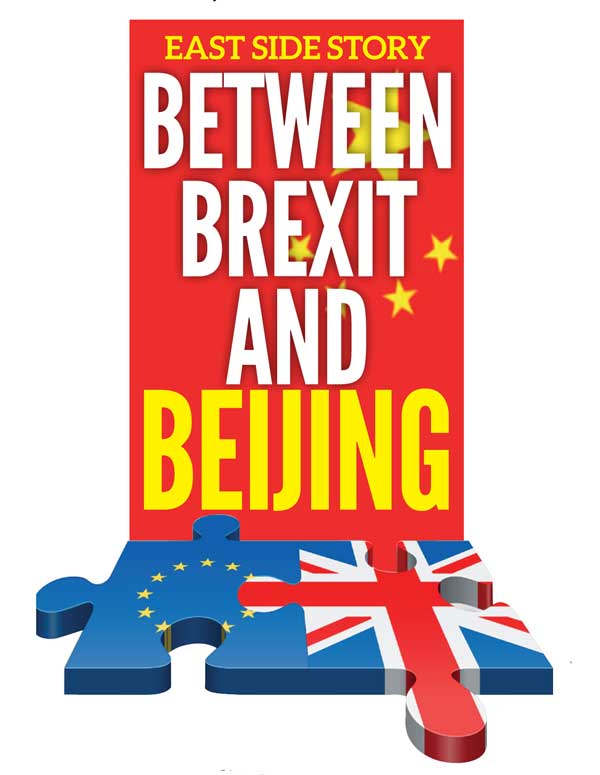Reply To:
Name - Reply Comment
Last Updated : 2024-04-24 20:15:00

 One belt, one road’, China’s blueprint to tie together Asia and Europe into one vast trading network, could reshape geopolitics and the world economy– The Economist (UK), June 30, 2016
One belt, one road’, China’s blueprint to tie together Asia and Europe into one vast trading network, could reshape geopolitics and the world economy– The Economist (UK), June 30, 2016
One gets a different perspective watching the global and national scenes, while on a ‘hybrid’ trip to China with my wife -a courtesy call on an old friend in a high place in the Chinese Government; a discussion with the Vice President of the oldest think tank in China founded, when Premier Zhou Enlai was Foreign Minister; much sightseeing from the swanky modernity of waterfront Shanghai to awe inspiring artifacts from millennia before Jesus and the Buddha; and the best food in the world (Including Beijing duck at the restaurant where Zhou hosted Kissinger).
With the UK leaving the EU and Scotland threatening to leave the UK, Greece and France wracked by street protests against austerity measures, two national elections within months and no stable majority in Spain, and an ideologically polarising presidential campaign in the USA, the West seems locked in a tightening crisis.
By contrast, China is a picture of calm confidence and cohesion. While Premier Li Ke Quiang’s address to the Summer Davos, shows that its leadership is acutely aware of the macro-economic challenges, China under the stewardship of the Communist Party (Plato’s Guardian class) has an achievement, which is quite unique: that of three decades of uninterrupted growth, devoid of depressions and crashes, and a rising standard of living for a vast swathe of humanity, 1.4 billion people.
On the external track China is the only country that is offering macro concepts that are non-military and are in the material interests of those nations and peoples. The US offers, for instance, the Pivot to Asia, which is at best a military-strategic counterweight for those of us who want one.
By contrast China’s ‘One Belt, One Road’ hopes to integrate the world economy while sharing elements of its own unprecedented success story, namely, infrastructure development as the key link and multiplier.
While the West is centrifugal, wracked by uncertainty and volatility, the East is centripetal, steadily drawing together, consolidating. The recent meeting of the Shanghai Cooperation Organization (SCO) saw approval for the requests of both India and Pakistan for incorporation. Russia’s President Putin made his 15th visit to Beijing and his host, China’s President Xi Jing Ping signed 30 bilateral agreements. The Asian Infrastructure Investment Bank (AIIB) of which the major shareholder is China, officially kicked off its activities, while Russia has launched the Eurasia Development Bank, and both have decided to cooperate. What China is striving to do is to generate an evolutionary change in the global political economy.
The strapline of the essay in the July 2, 2016 print edition The Economist (the journal which Karl Marx once called “the most intelligent defender of capitalism”) reads: “China’s foreign policy could reshape a good part of the world economy.”
That change, which introduces a greater balance and provides far more options for the developing countries (For instance, the AIIB will be more generous towards projects with long term benefits such as infrastructure) is decidedly in the national interest of Sri Lanka. The Chinese efforts are far more beneficial or far less harmful to the developing world than is the acceptance of the IMF conditionality, which actually drives down the living standards of the peoples of the developing world, such as Sri Lankans—with socio-politically dangerous consequences.
China’s ‘global dream’ is neither neo-liberal globalization nor anti-globalization; it is not an alternative to globalization but rather an alternative globalization; more balanced, politically non-intrusive. China both exemplifies and globally enables an alternative, organic modernity.
What is China attempting at a grand strategic level?
China’s is certainly not an offensive strategy. The impression I clearly got from my conversations is that elements in the US may consider China an adversary, but China is both unfazed and unprovoked. Whoever wins whichever election in the West or in whichever ally of the West in the developing world, China feels that she is far too large a component of the world economy for any country to retrench from. In other words China is the world’s truly indispensable economic power. Moreover, China senses that the West will not and cannot move against it beyond a point, without incurring colossal economic damage to itself.
China also looks at the human and commercial magnitude of the myriad ties between itself and the West, concluding that the dense texture of interaction is far too thick for the West to sever. The Chinese long game is weaving a rich tapestry of economic interdependence and counting on economic evolution which will make the global balance less unequal.
The core strategic dimension of China’s global thinking is centred on Eurasia as a centre of gravity, and hence the closer cooperation with Russia. In what is clearly a defensive rather than an offensive strategic posture, China and Russia regard each other as reliable “rear areas”, relatively safe from each other’s adversaries, rivals and competitors—though targeted at their peripheries by Western power projection and ‘Soft power/Colour Revolution’ tactics.
The ideologically hypnotized faction of the government looks West, when every indicator shows that Sri Lanka’s national interest is far better served looking East; in being “Asia-centric” rather than West-centric.
Economically it makes perfect sense for Sri Lanka to piggyback on Chinese surpluses as well as its global projects and institutional initiatives. The model of China as the enormous motor, which powered the much smaller motor of the Sri Lankan economy was eminently rational, but in its ideological irrationality the UNP initially delinked abruptly from China. Even now it looks to the IMF and the World Bank—a dogmatic delusion for which it has just begun to pay the price in the form of the ‘VAT Hartals’. The Iranian Revolution (1979) began with the “Bazaaris”.
The economic gravitational pull of China was evidenced by Prime Minister Wickremesinghe’s reverse belly crawl all the way back to Beijing. However, I didn’t get the impression that Beijing was the place to be hustled by the tactic of sucking in the Chinese to subsidize and sub-serve a strategy that converts this island in to a chokepoint to interdict the Maritime Silk Road and a link in a chain intended to ‘contain’ China.
Top officials in the Chinese Foreign Ministry and its apex think tank reiterated in their conversations with us that China does not believe that any country should feel superior enough to urge internal policy changes on any other country; that external intrusion has manifestly damaged States and disintegrated societies in country after country; that after a long war a country should look to the future rather than to the past in the search for reconciliation; that prescriptions from outside could re-open wounds and complicate reconciliation; and that external pressures on so-called accountability could cause domestic discontent that undermines the stability imperative for investment and economic development, which constitutes the only way to fulfil the growing material aspirations of the populace and is the only real foundation for long term reconciliation and social harmony. Clearly, Sri Lanka’s core national interests are far more congruent with, and its domestic stability far better served by, the global perspective of China -and Eurasia in general-than with/by the (Tamil Diaspora influenced)West. Beyond even Singapore, China is the closest I have encountered to Plato’s Republic. Furthermore, having watched an incredible display of Shaolin Kung Fu of the purist Beijing school and seen elaborate evidence of an 8,000 year old civilization in the Shanghai Museum, I understood that this was a country with the historical and civilizational depth.

Add comment
Comments will be edited (grammar, spelling and slang) and authorized at the discretion of Daily Mirror online. The website also has the right not to publish selected comments.
Reply To:
Name - Reply Comment
US authorities are currently reviewing the manifest of every cargo aboard MV
On March 26, a couple arriving from Thailand was arrested with 88 live animal
According to villagers from Naula-Moragolla out of 105 families 80 can afford
Is the situation in Sri Lanka so grim that locals harbour hope that they coul